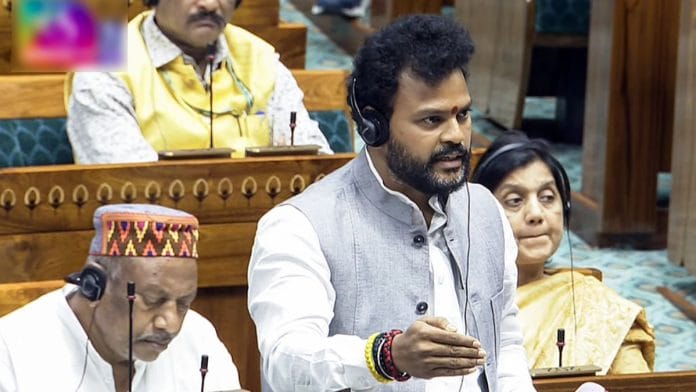New Delhi: Civil Aviation Minister K. Ram Mohan Naidu introduced the Bharatiya Vayuyan Vidheyak 2024, which seeks to replace the 90-year-old Aircraft Act 1934, in Lok Sabha Wednesday.
The bill seeks to simplify civil aviation regulations by addressing ambiguities in the Aircraft Act, enhance ease of doing business and aid manufacturing in aviation, the minister said.
Talking about the reasons for introducing the new bill in Parliament, the minister said the existing Aircraft Act was established during British rule in 1934, and since then at least 21 amendments have been made to it.
The amendments, he said, were “plugged into the original Act in bits and pieces because of which there was a lot of confusion in the Act. There’s a lot of grey area. There was a lot of redundancy”. Hence, a “new principal” act has been proposed to remove the confusion and redundancies that exist, Naidu said.
The proposed bill will also ensure that the civil aviation rules and guidelines are in sync with standards and practices recommended by the International Civil Aviation Organization guidelines, he added.
The bill was introduced amid protests from a section of the opposition over the Hindi nomenclature of its title.
“I would like to oppose the introduction of the bill…The name of the original bill was Aircraft Bill 1934. The title of the bill was in English. The contents of the bill are also in English. Now, the government wishes to change the nomenclature of the title of the bill. But the contents of the bill are in English…The aircraft bill is to be amended as Bhartiya Vayuyan Vidheyak 2024. For people from the southern part of India, it is very difficult even to pronounce it. What is the logical reason why this is being changed?” N.K. Premachandran, an MP from Kerala, asked while opposing the introduction of the bill.
In response, Naidu said that the issue of Hindi nomenclature has extensively been discussed in the past with bills such as when the three criminal bills — the Bharatiya Nyaya Sanhita, Bharatiya Sakshya Adhiniyam and Bharatiya Nagarik Suraksha Sanhita — were introduced last year.
“We are not violating any constitutional provision by mentioning the name of the Act as Bharatiya Vayuyan Vidheyak. We want to make a new identity for India and hence we have named it such…It is just to create our own identity. The text is in English,” the minister responded.
The Bharatiya Vayuyan Vidheyak, 2024, seeks to “repeal and re-enact” the Aircraft Act, 1934, according to the text of the bill. It empowers the central government to make rules regulating the design, manufacture, maintenance, possession, use, operation, sale, export or import of any aircraft or class of aircraft and to secure the safety of aircraft operations. It also empowers the government to make rules to investigate any accident or incident; prevent dangers to public health arising from the introduction or spread of any infectious or contagious disease; and demolish buildings or structures or cut trees within a specific distance of the aerodrome.
The bill does not propose the creation of any new body that would result in additional financial implications. Existing bodies such as the Directorate General of Civil Aviation (DGCA), Bureau of Civil Aviation Security (BCAS) and Aircraft Accident Investigation Bureau (AAIB), were set up under the Aircraft Act, 1934, and their expenditure is met by yearly government budgetary support, according to the financial memorandum in the bill.
Similarly, the provisions regarding emergency powers of the central government for protecting public health and the manner of determination and payment of compensation for loss or damage are already in place under the Aircraft Act,1934, and no changes are proposed in the relevant sections.
“The bill has no financial implication and does not involve any additional expenditure of recurring or non-recurring nature from the Consolidated Fund of India,” it noted.
The bill aims to expand regulatory authority over the Indian aviation sector to enforce stricter compliance and safety standards, said Bhavana Yerrumreddy, Partner-Aviation, EY India, in a statement.
“The bill also includes provisions to regulate aircraft design and manufacturing in support of the ‘Make In India’ initiative, coinciding with plans for a new helicopter assembly facility in India by a leading aircraft OEM,” Yerrumreddy said in the statement.
“The MRO industry is a crucial support sector for aviation, with India’s MRO market estimated to be worth $1.0- $1.7bn for commercial aircraft fleet, expected to grow at ~9% annually to reach $4bn in 2031. Currently, only 15-20% of this market is serviced locally, with the majority (80-85%) being serviced overseas. The bill also outlines regulations for the development of maintenance, repair, and overhaul services to ensure a strong infrastructure for aircraft upkeep,” according to the statement.
(Edited by Sanya Mathur)
Also read: Environment funds collected by pollution board in past 5 yrs largely unused, reveals govt response






